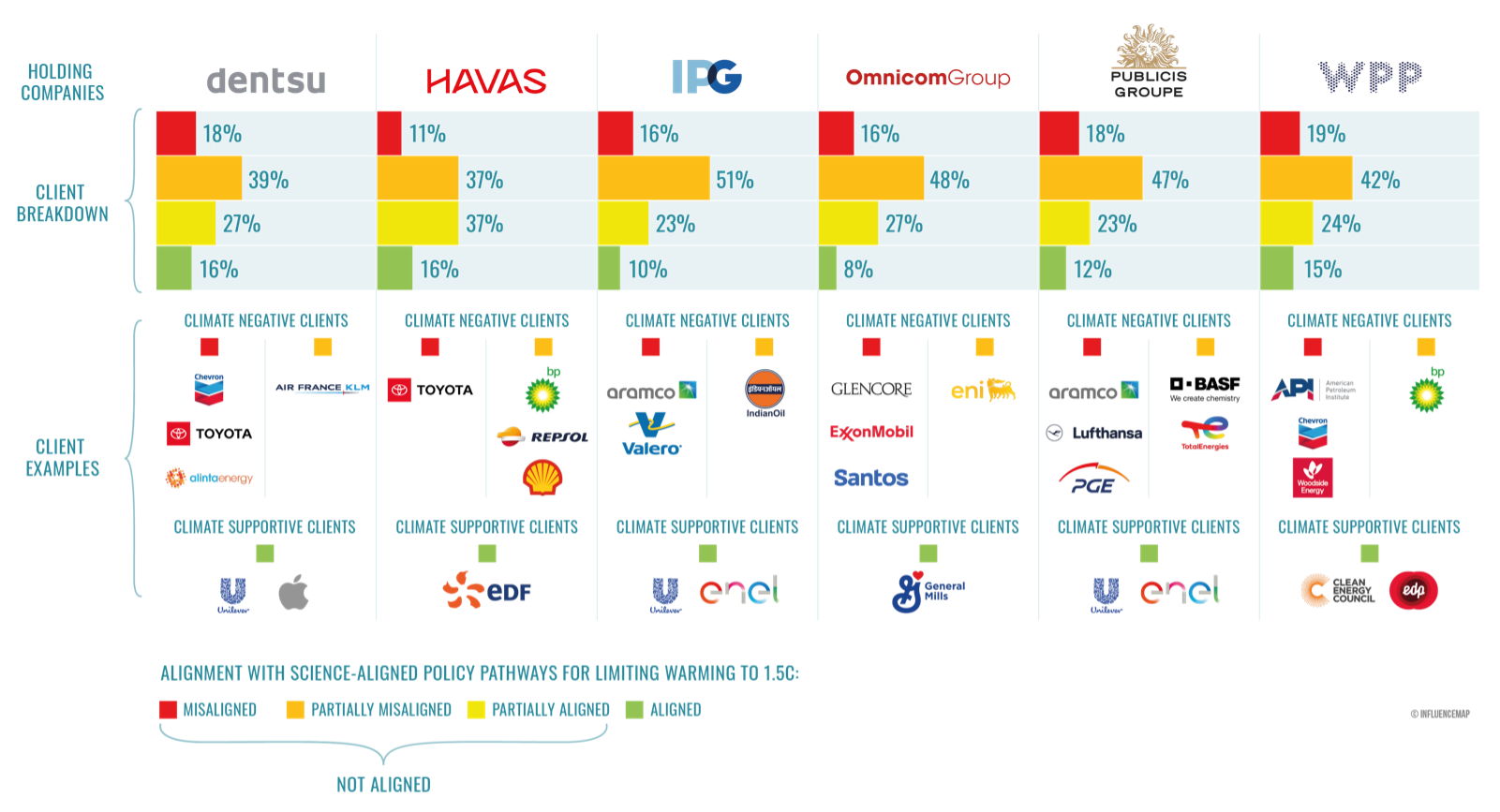A new report from InfluenceMap covers the ‘Big Six’ Advertising and Public Relations (PR) firms: Dentsu, Havas, IPG, Publicis, Omnicom, and WPP. The research finds that ‘green’ clients – defined as those supportive of the goals of the Paris Agreement in their climate policy advocacy – constitute the minority of clients in the dataset for all holding companies except Havas. WPP has the highest proportion of obstructive corporate clients. Among all holding companies, the prominence of negative clients over positive clients is particularly notable in the energy and automotive sectors.
The research uses available client lists to map the corporate clients of the ‘Big Six’ since 2020. Of the clients identified, the report assessed those that feature in the LobbyMap database based on their climate policy engagement, to highlight the relative exposure of these holding companies to clients who are trying to frustrate progress towards the goals of the Paris Agreement via their climate policy advocacy.
According to the UN Guide for Responsible Engagement with Climate Policy, PR and advertising are core parts of the lobbying toolkit used by the fossil fuel sector to negatively influence climate policy and the broader climate agendas of governments. This works in several ways, including by influencing public opinion on a specific issue, improving the reputation of a client in relation to climate change, and helping to develop markets for products that are not aligned with science-based pathways to 1.5°C. The lack of transparency in this sector makes a comprehensive assessment of the sector and its links to climate obstruction challenging. However, this report lays out a clear blueprint for assessments of this kind going forward, which can begin to shed light on the extent to which companies that engage negatively on climate policies are taking advantage of advertising tactics to further their agendas.
The report also finds that no holding companies have policies in place to effectively address their ongoing work with obstructive clients – despite several of the companies, including Dentsu and WPP, acknowledging the reputational risks of working with high emissions clients.
For example, although WPP has pledged not to take on any work designed to frustrate the goals of the Paris Agreement they have continued to work with the American Petroleum Institute – which previous InfluenceMap research has ranked as one of the most obstructive industry associations in the world on climate policy. Since 2012, WPP has been paid $4,650,000 for the services provided to API via its subsidiary Ogilvy Government Relations.
In addition, this report exposes the significant potential for ‘conflicts of climate interest’ within these holding companies—where clients of the same holding company have opposing objectives in their climate policy advocacy, sometimes in the same jurisdiction:
As shown in Table 1 all 6 holding companies are significantly exposed to ‘Red Clients.' Clients in this category include the American Petroleum Institute (WPP: contract in 2023, LobbyMap Grade: E-), Valero (IPG: 2023, E-), Chevron (Omnicom, Dentsu and WPP: all 2023, D-), Lufthansa (Publicis Groupe: 2023, D), and Toyota (Dentsu, Havas, IPG, Omnicom,Publicis Groupe: all 2023, D).

This report builds on the recommendations of Race to Zero in its September 2024 paper ‘Catalysing climate action: The role of professional service providers in realizing a net-zero future’, which recommends Professional Service Providers assess their work and clients through the lens of climate performance, including corporate advocacy on climate policies. This seeks to address the fact that the service industry is often regarded as ‘green’ due to its lack of scope 1 and 2 emissions, and to introduce the concept of ‘serviced emissions’ to draw attention to the fact that many high emission sectors would not be able to operate without the help of their service providers.
This report reveals that the PR and Advertising sector is not as green as it would like to portray. Giants of the industry continue to work with clients that are obstructing the goals of the Paris Agreement, amplifying their voices and helping to grow their businesses, even as they continue to contribute to worldwide system collapse.
It is critically important that agencies understand how exposure to obstructive clients calls into question the authenticity of their own climate commitments and how the work done for them ties into harmful lobbying agendas. As many positive clients look to embed climate considerations throughout their businesses, perceived ‘conflicts of climate interest’ could put the future of the ‘Big Six’ holding companies at risk.”
"To align with a 1.5°C world, investors must scrutinise the role and impact of all companies in their portfolios. This insightful report from InfluenceMap highlights the potential links between PR holding companies and anti-climate lobbying efforts, serving as a crucial call to action to engage those companies on their ‘conflicts of climate interest’ and ensure their influence supports—not hinders—global climate goals."
Kitty Hatchley, Media Manager, InfluenceMap (London). Email: kitty.hatchley@influencemap.org